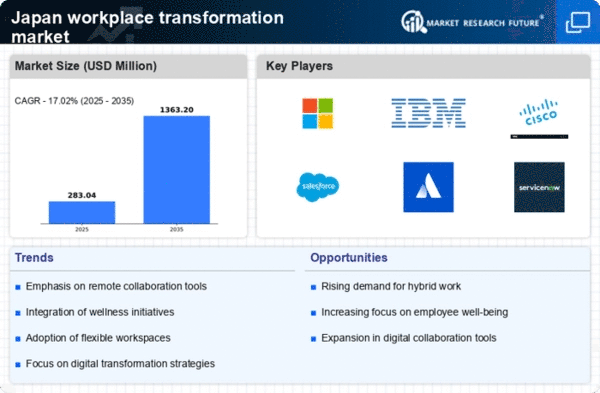Rise of Remote Work Culture
The increasing acceptance of remote work in Japan is reshaping the workplace transformation market. Organizations are adapting to this trend by investing in digital collaboration tools and virtual communication platforms. According to recent data, approximately 30% of Japanese companies have implemented remote work policies, which has led to a significant shift in workplace dynamics. This transformation necessitates the redesign of office spaces to accommodate hybrid work models, where employees can seamlessly transition between remote and in-office work. As a result, the workplace transformation market is witnessing a surge in demand for innovative solutions that enhance connectivity and productivity, ultimately fostering a more flexible work environment.
Focus on Sustainability Initiatives
Sustainability is becoming a pivotal driver in the workplace transformation market in Japan. Companies are increasingly prioritizing eco-friendly practices, which influences their office design and operational strategies. Recent statistics indicate that over 40% of Japanese firms are actively pursuing green certifications for their buildings. This trend compels organizations to invest in sustainable materials, energy-efficient technologies, and waste reduction strategies. The emphasis on sustainability not only enhances corporate social responsibility but also attracts environmentally conscious employees. Consequently, the workplace transformation market is evolving to incorporate sustainable solutions that align with the values of both businesses and their workforce.
Government Policies Supporting Innovation
Government initiatives aimed at promoting innovation are driving the workplace transformation market in Japan. Policies that encourage digital transformation and support startups are fostering a conducive environment for workplace evolution. For instance, the Japanese government has allocated substantial funding to enhance technological infrastructure, which is expected to boost productivity across various sectors. This support is likely to encourage companies to invest in modernizing their workplaces, integrating cutting-edge technologies, and adopting flexible work arrangements. Consequently, the workplace transformation market is poised for growth as organizations leverage government resources to innovate and enhance their operational capabilities.
Technological Advancements in Communication
Technological advancements are significantly impacting the workplace transformation market in Japan. The integration of advanced communication tools, such as AI-driven chatbots and virtual reality meeting platforms, is enhancing collaboration among teams. Data suggests that companies utilizing these technologies experience a 25% increase in employee engagement and productivity. As organizations strive to create more interactive and efficient work environments, the demand for innovative communication solutions is likely to grow. This trend indicates a shift towards a more interconnected workplace, where technology plays a crucial role in facilitating seamless interactions and fostering a collaborative culture.
Changing Demographics and Workforce Expectations
The evolving demographics of the workforce in Japan are influencing the workplace transformation market. With a growing number of millennials and Gen Z employees entering the job market, organizations are compelled to adapt to their expectations for a more inclusive and dynamic work environment. Research indicates that 70% of younger workers prioritize flexibility and work-life balance, prompting companies to rethink their workplace strategies. This shift may lead to the development of more collaborative spaces and amenities that cater to diverse employee needs. As a result, the workplace transformation market is likely to see increased investment in creating environments that foster innovation and employee satisfaction.
















